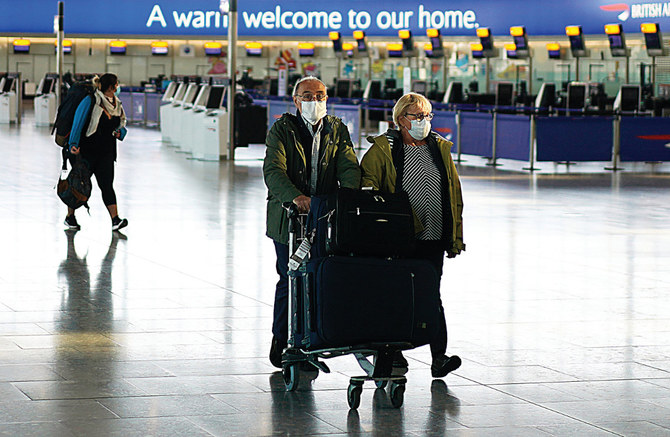LONDON: British travel company Jet2 said it was canceling holidays until late June, blaming uncertainty in UK government plans for restarting international travel, which were condemned by airlines.
Flight operators had been counting on government proposals published on Friday to allow planning for a summer getaway season, but the industry criticized the release for not including a start date for travel or listing which countries would be open for holidaymakers.
“We are extremely disappointed at the lack of clarity and detail,” said Jet2 CEO Steve Heapy. “The framework lacks any rigorous detail about how to get international travel going again.”
Jet2, the UK’s third largest carrier by passenger numbers, said it had no choice but to cancel flights and holidays to June 23, over a month later than the May 17 date the government has said is the earliest for international travel to resume.
The country’s largest airline, easyJet, also criticized the government’s plans, saying the requirement for an expensive PCR COVID-19 test for trips to low-risk countries would mean that only wealthy people could take holidays abroad.
Airlines and travel companies are desperate for a bumper summer after a year of restrictions. Without a high level of unrestricted travel, some could be left struggling to survive or needing fresh funds.
The government has proposed a traffic light system, with countries falling into red, amber or green categories based on COVID-19 risks. Green countries will require a PCR test which costs about 100 pounds ($135) for travelers once they arrive back in the UK.
Airlines will need to wait until early May to hear when international travel can restart, said the government.
“This does not represent a reopening of travel as promised by ministers,” said Airlines UK, an industry body which represents British Airways, easyJet, Ryanair , Virgin Atlantic and others. “It is a further setback for an industry on its knees.”
EasyJet said the PCR test cost is higher than some of its fares, and called on the government to reassess its plan.
“This risks reversing the clock and making flying only for the wealthy,” said easyJet CEO Johan Lundgren.
Britons have embraced the era of low cost travel over the last 20 years and are among Europe’s highest spending tourists. In 2019, more than six in ten Britons took a foreign holiday.
Transport Minister Grant Shapps said that the government wanted to make testing for travel cheaper and suggested that in time, the PCR test could be changed for a more affordable lateral flow test.
“We are committed as a government to work to drive those costs down, and also in time of course review potentially the type of test,” he told the BBC.
The framework for travel will be reviewed at the end of June, July and again in October, the government has said.
“I’m not telling people that they shouldn’t book some holidays now,” Shapps said. “It’s the first time I’ve been able to say that for many months.”
Case numbers in Britain have dropped dramatically since a January peak under a strict lockdown which banned holidays, but a government priority is to avoid undermining the success of its vaccination program by importing vaccine-resistant variants from overseas.
Under the traffic light system, restrictions such as hotel quarantine, home quarantine and compulsory COVID tests will apply differently depending on which category of country a passenger arrives from.
A digital travel certification system would also be part of the plan but the proposals gave few details beyond saying that Britain wanted to play a leading role in developing standards.
















